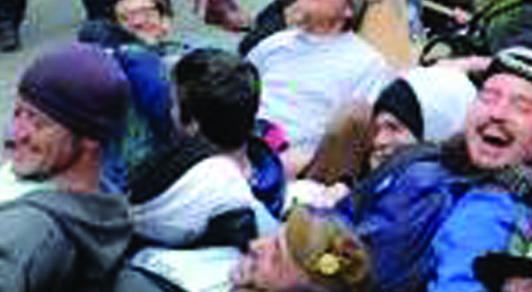
- This event has passed.
On Rebel Friendships and Affinity Groups

An Interactive Talk and Workshop
with Benjamin Shephard
Rebel Friendships considers the interplay between individuals and their friendships with social movements. The intersections between individual and community, the ways we experiment with social change, explore, create, and reduce the harms of modern living are the work of social movements. Yet, the process is rarely simple. Through auto-ethnographic reflections of experiences with the Beats, ACT-UP, Occupy Wall Street, anti-consumer, queer rights, and non-polluting transportation movements Shepard explores the way friendship infuses social movements with the social capital necessary to move bodies of ideas forward. Such innovation is rarely seen in more institutionalized social arrangements. Rebel Friendships offers a new take on the ties between friends who are connected through affinity and efforts aimed at social change.
This workshop explores both the history and applications organizing around friendships. It will begin with a talk and finish with a longer conversation and workshop about friendships. Hopefully we can all make a few along the way.
“A daring and innovative approach to social movements – Shepard’s book is a treasure and tool. Taking on the importance of affect, friendship, care and trust in movements he at once teaches the reader and entertains simultaneously. This trailblazing book addresses an area of social movements studies woefully under researched and does a stupendous job of capturing theory, history and feeling – all the while using a narrative form that makes the reader not want to put down the book.”
—Marina Sitrin, author of Everyday Revolutions: Horizontalism and Autonomy in Argentina and co-author of They Can’t Represent Us!: Reinventing Democracy from Greece to Occupy.
Benjamin Shepard, PhD, is an Associate Professor of Human Service at New York School of Technology/City University of New York. As a social worker he worked in AIDS housing settings from San Francisco to Chicago to New York, where he directed the start ups for two congregate housing programs for people with HIV/AIDS, as well as served as Deputy Director at CitiWide Harm Reduction..
Much of Dr. Shepard’s scholarship is based on the ethnographic study of social services and social movements. Recent works include Play, Creativity, and the New Community Organizing (Routledge, 2011), Queer Political Performance and Protest (Routledge, 2009), The Beach Beneath the Streets: Exclusion, Control, and Play in Public Space (co-written with Greg Smithsimon) (SUNY Press, 2011) and Community Projects as Social Activism (Sage).
He has done organizing work with Occupy Wall Street, AIDS Coalition to Unleash Power (ACT UP), SexPanic!, Reclaim the Streets New York, Times UP, the Clandestine Rebel Clown Army, the Absurd Response Team, CitiWide Harm Reduction, Housing Works, the More Gardens Coalition, and the Times UP Bike Lane Liberation Front and Garden Working Groups. Combing ethnography with social change activism, his work considers the interplay between lived experience and history, between theory and practice.
From Ben: “We need rebel friends, not facebook friends,” declared John Jordan. When I heard him say that, I started writing Rebel Friendships: “Outsider” Networks and Social Movements. It is a book inspired by the world of organizing we have all created, along with the lovely and messy ways we go about creating change through our own invisible committees, affinity groups, and networks of comrads. Some of the chapters I’ve been drafting for years now. The work covers my experiences with the first person I know to die of AIDS, my godfather Fred, who worked at Keller’s bar on the West Side of Manhattan, my recollections of towel snapping and high school football, identify blurring AIDS activism in San Francisco, drag marches in New York, anarchist bikers, Occupiers, and universal stories of friends still taking care of each other and their friends coping with premature losses, overdose, and struggles over what we hope our world can be.
